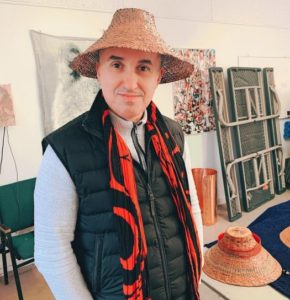For new Camosun College Student Society (CCSS) First Nations director Richard Doucet, who is a first-year Camosun Indigenous Studies student, being in politics gives him a chance to have a voice that can be used for the benefit of people around him, who he cares about. Doucet, who is Indigenous, knows that wasn’t always the case in this country. Growing up, his father told him stories of being told he couldn’t use the public washroom or take the school bus. Today, Doucet has seen people be discriminated against in stores, and he has a lot of anxiety around reconciliation, because while we have taken a few of the right first steps as a society in recent years, there is still a long way to go. But it comes down to healing yourself first, he says.
“It’s just something that really, really was hurtful, and that really bothered me for a lot of years; you know, wanting to stand up for [my father] as far as that goes,” says Doucet. “Over the course of decades, there was a lot of healing involved, and he still told the same story, but it was in a proud way instead of being in an angry way, because he found that healing… once you heal yourself and once you know who you are in this world, it’s just going to make a big difference.”

Doucet shares that sentiment with Camosun students who come to him hurting due to the many different types of discrimination they’ve experienced. Understanding how other people think and where they are coming from is key because colonialism is still very much in effect, says Doucet.
“The only way we’re going to break that cycle is by everybody communicating and getting on the same page to change everybody’s perception,” says Doucet, adding that one of the main reasons he enrolled in the Indigenous Studies program at the college is because it’s really important to focus on this current generation. “I want to experience what the youth are experiencing, and you have to be there with them in order to experience those anxieties and those problems.”
Doucet says his primary job is going to be capturing the voice of students at Camosun, and that comes down to hard work and putting in the time.
“And really, really working hard—working long hours— to try and put through whatever objectives I can to make a difference,” he says.
Doucet says that many issues facing Indigenous students are a result of financial barriers.
“Indigenous students, the majority seem to really, really have a problem with financials. It definitely is an issue; it’s just something that will be big on my agenda. We’ll go back to connection, and people you know, and talking to the right people. If there’s programs that can be set up to where funding is even more available, I want to be the first one in line to try and get those implemented through the council. I really, really want to make that an objective and try and find more funding for our Indigenous students.”
The best way to combat struggle is to be completely open, says Doucet. As an example, he says, if students are having an issue with a teacher, he can be the one to send off an email in a very positive way.
“I want, just, 24-hour access with them,” says Doucet. “There is no time that students, or people in general, [don’t] have issues… During these times when COVID is around, I think that’s just the best way to go about it.”
